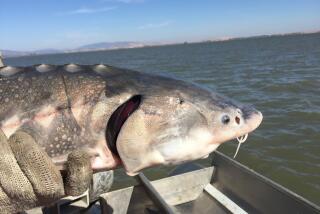It Looks Like Hard Times Ahead for the Caviar Crowd
- Share via
It’s enough to make a gourmet’s stomach turn.
The U.S. government may ban prized beluga caviar--the delicate, shimmery roe once reserved for Russian royalty, the rarest and most expensive fish eggs in the world.
The fish that lays the eggs--the beluga sturgeon--is on the brink of extinction. Too many are being pulled from the Caspian and Black seas and sliced open by fishermen searching for a mother lode of gunmetal-gray eggs that can sell for $1,500 per pound.
So the U.S. Fish and Wildlife Service has proposed labeling the fish “endangered” and banning the import of beluga caviar.
Connoisseurs hasten to point out that beluga is one of three highly prized Russian caviars and that the other two will still be available.
Beluga, the mildest, bursts with a crisp, ocean flavor when pressed against the roof of the mouth. Slightly less pricey than beluga and lesser known, the other two are ossetra and sevruga, also named after the sturgeon that bear them. Some enthusiasts prefer the nutty taste of the ossetra, while others appreciate the tiny-grain texture of the sevruga.
“It’s hard to compare,” said Paul McBride, general manager of the Petrossian Paris specialty food shop and cafe in West Hollywood. “It’s a lot like wine, where it’s all personal taste.”
Still, he said, “beluga has always been the most popular. It’s because it’s the most expensive and the first caviar people think of.”
“Beluga is probably our No. 1 seller,” said Patricia Meacham, manager of the Caviarteria Beverly Hills. A ban “would affect the business immensely. A lot of people want what they want.”
And in the upper echelons of American society, what they want is beluga. In 2000, Americans consumed 15 metric tons of beluga--80% of the world’s legal supply. The illegal harvest is believed to be more than 10 times that.
The eggs, also known as “berries” or “pearls,” can theoretically be removed without harming the fish, which can grow to 30 feet and more than 2,800 pounds.
But “the most cost-effective way of getting eggs is to kill the sturgeon,” said Pat Fisher, a spokeswoman for the federal wildlife agency. “It’s hard to tell the males from the females, so they kill them all.”
The U.S. Fish and Wildlife Service proposed protecting the fish last month. The public may submit comments until late October; the government is expected to make a decision by August 2003.
“If listed as endangered ... commercial imports, exports ... and interstate commerce of beluga sturgeon would be prohibited,” the agency announced July 31.
Caviar enthusiasts, though disappointed, largely understand why the move is necessary.
“They’re raping the Caspian Sea,” said Judi Latkin, the manager of Wally’s, a Westside wine shop that’s one of a few places in the Los Angeles area to stock the three types of Russian caviar.
At Wally’s, jars and tins of high-grade caviar are kept in a freezer set to 35 degrees. The beluga goes for $68 an ounce. Nearby are displays of mother-of-pearl spoons and plates for serving the caviar. It can’t be eaten with metal--other than gold, of course--because it gives the salted roe a tinny taste.
Ensuring that this experience isn’t lost forever drives some caviar enthusiasts to support the ban.
“Otherwise, we’re not going to have beluga for our kids or our grandchildren,” said Adolfo Alvarega, the deli manager at Wally’s. He, like other caviar lovers, hopes that once the species rebounds, the ban will be lifted.
Environmentalists agreed, noting that the sturgeon population is so depleted that some scientists believe the fish are no longer reproducing in the wild.
“They’re circling the drain,” said Lisa Speer, a senior policy analyst with the Natural Resources Defense Council’s New York office. The council, the Wildlife Conservation Society and Sea Web petitioned the federal government to take action on the beluga sturgeon. “The question is whether we can rescue them in time,” Speer said.
She said a strong management plan to bring back the stock is necessary. But that is out of American hands.
Until the late 20th century, the Soviet Union controlled a state monopoly on the Caspian caviar fishery. “They exerted total control over the fish,” Speer said. “You stuck your thumb in the Caspian Sea and you were exiled to Siberia for the rest of your life. That disintegrated when the Soviet Union fell apart.”
Now a patchwork of nations claims fishing rights.
Beluga sturgeon, slow to mature and produce eggs, are protected by an international treaty. But wildlife officials, environmentalists and the caviar industry itself acknowledge that there is a gross amount of over-harvesting that feeds the massive black market for beluga caviar.
It’s that black market that worries environmentalists the most. If the import of beluga is criminalized in the United States, many people believe the black market will expand exponentially.
Robert Wilson, executive sous chef at the Ritz-Carlton Laguna Niguel in Dana Point, said several chefs and vendors have told him:
“If they put a ban on beluga there would still be plenty.... The black market’s so big, they would never not have it.”
Wilson is among the chefs who prefer ossetra. But, he said, people who would rather eat beluga will be disappointed if the proposed ban becomes reality.
“For those people who do enjoy it, obviously, it will be missed,” he said. “I don’t think it’s going to cause the demise of the hospitality industry, but it will affect our clientele.”
McBride of Petrossian Paris said customers who eat caviar regularly will probably try the other types. But those who enjoy caviar rarely--only four or five times a year--are likely to be the most disappointed if the ban is adopted, he said.
“They buy beluga because it’s what they know.... They’re going to be the ones who say, ‘There’s no beluga caviar? Forget it, I don’t want anything.’ ”
McBride cautions concerned beluga fans not to try to stockpile the delicacy by freezing it. The eggs’ shells will disintegrate, leaking a goopy black marmalade-like substance.
He added that while he expects the ban to affect business, “I don’t think it’s going to kill the market.”
“In the industry, we’ve been talking, and we think it’s a good idea in the long run. Five, 10 years from now, there will still be caviar to have a business.”
More to Read
Eat your way across L.A.
Get our weekly Tasting Notes newsletter for reviews, news and more.
You may occasionally receive promotional content from the Los Angeles Times.











